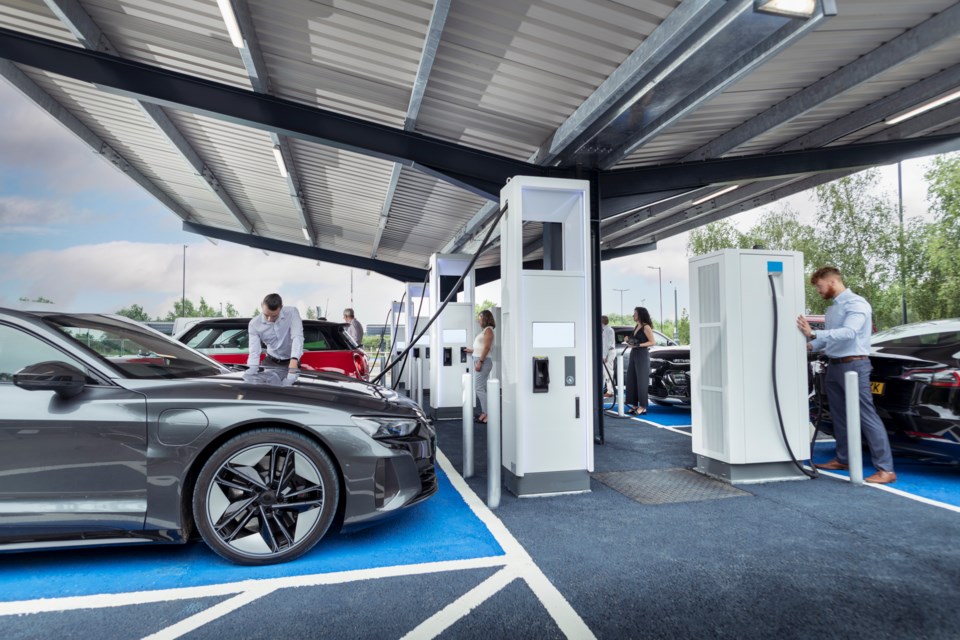News recently broke that B.C.’s electric vehicle rebate is under government review, a decision some have tied to the removal of B.C.’s consumer carbon tax and whether it creates a funding gap for the program.
It helps to start with the facts. B.C.’s EV rebate was not funded by the province’s late consumer carbon tax and, in fact, the policy isn’t funded by taxpayers at all.
B.C.’s EV rebate is funded by BC Hydro, which collects revenue as a result of another climate measure called the low-carbon fuel standard. Fuel producers regulated under the standard can either make their fuel cleaner—for example, by blending in biofuels or distributing electricity—or purchase credits from cleaner fuel producers.
BC Hydro earns money from these credits, which the electric utility uses to help British Columbians purchase money-saving, pollution-cutting electric cars.
But in conducting a review, B.C. has a critical opportunity to ensure more families benefit from EV rebates. We should absolutely not walk away from a program that saves considerable costs for British Columbians, our health-care system and our climate—especially when our friends in Quebec and California are stepping up, not back.
When B.C. removed its consumer carbon tax, it was crystal clear that the province would need programs in place to help households make the switch. Experience time and again has proven that EV rebates are incredibly effective—and frankly necessary if B.C. wishes to still consider itself a North American climate leader.
Change, however, is indeed needed. Roughly two years ago, B.C. introduced an income cutoff for its full EV incentive ($80,000) that is now below the average income of full-time workers in the province between the ages of 25 and 54. It also has not kept up with annual wage increases.
In short, many retirees qualify, but middle-class working parents struggling to buy their first townhouse often do not. This is even more disharmonious than it sounds, given that more than three in four Metro Vancouverites under 44 are inclined to buy an EV as their next car, according to a survey Clean Energy Canada undertook with Abacus Data due for public release this spring. An overwhelming 80 per cent of respondents also say they support incentives for clean technologies such as EVs, while those who did not qualify for the full rebate were twice as likely to say their exclusion was unfair than fair
It almost goes without saying that we shouldn’t be excluding teachers and nurses from incentives to buy new EVs, but in many cases, that is exactly how the policy in its current form functions. The EV rebate is a distinctly middle-class measure that excludes much of the working middle class.
It’s also worth noting that the current policy includes a vehicle price limit of $50,000, so luxury vehicles like Teslas are already excluded. This restriction we agree with, as it more elegantly excludes fancy cars and the people who buy them.
Truly lower-income, lower-wealth individuals are not buying new cars of any powertrain, period. What will benefit them is a healthier used car market. How do we create the conditions for a better used market? Simple: get more EVs into the province. Every new car is destined to become a used one.
Today, you can buy a used Chevrolet Bolt—a popular electric hatchback with impressive range—with relatively low mileage for around $25,000 in the province. Not a bad deal for a car that could save you $2,000-3,000 a year on fuel. That kind of used EV at that price point wasn’t available even a few years ago, but B.C.'s historically high EV adoption rate has fed a more abundant and competitive used market.
Unfortunately, once Canada’s EV king, B.C. now ranks a distant second behind Quebec. In 2024, S&P Global reports EV sales in Canada’s French province reached an impressive 33 per cent compared with just 23 per cent in B.C. Two years ago, those numbers were 20 per cent and 23 per cent, respectively.
Sales in B.C. are flatlining because the program is excluding its most willing adopters: young, working British Columbians. People who could be enjoying considerable fuel savings every year, which they instead might spend at local businesses rather than lining the pockets of fossil fuel companies
The other hidden costs of gas cars are considerable. A Health Canada study found that air pollution from road transportation leads to $1.3 billion in health-care impacts annually in the province.
Or roughly the value of BC Hydro incentivizing half a million EV sales with a widely accessible $2,500 rebate. Now there’s an idea.
Joanna Kyriazis is the director of public affairs and Evan Pivnick is the clean energy program manager at Clean Energy Canada, a think tank at Simon Fraser University’s Morris J. Wosk Centre for Dialogue.



